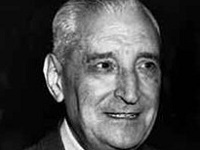Portugal is longing for dictatorship
The Portuguese, like the Spaniards and Greeks, are dissatisfied with their government unable to overcome the current crisis. On these grounds many are nostalgic for the days of the dictators: Greece elected far-right nationalist and even fascist parties into parliament, and Portugal announced the dictator Antonio de Olivera Salazar "the greatest Portuguese" of all time.

July 27 marked 42 years since the death of Antonio de Olivera Salazar. He ruled the country for 40 years. Under him Portugal's economy prospered: GDP in the early 1970's was 7% per year. Why is the Portuguese economy not in the best condition now? Perhaps, the secret lies in the personal qualities of the politicians working for the benefit of the people.
The ability to bring together a decent team not working for the Americans or Germans is also important. This is true about Salazar, although no one denies the horrors of a totalitarian regime. However, the style of Salazar's government had nothing in common with Stalin's repressions and Nazi genocide; rather, he stuck to authoritarian policies and nationalist attitudes in order to preserve the colonial empire.
For the Chairman of the Council of Ministers, all in politics was relative. He engaged in politics as he saw fit and always objected when he was called a "brutal dictator."
He believed that he was not accepted because his position was contrary to the "Western intellectual tradition." Salazar borrowed his methods of governing from ancient Greek politicians and believed that active members with the public interests should participate in the country's management. He found these people, formed a team and established something that Portugal now calls "corporate" management.
Antonio Salazar was born on April 28, 1889 in the town of Vimieyru 70 kilometers north of Lisbon. After graduating from the seminary, he entered the law faculty of University of Coimbra (Universidade de Coimbra). There he made friends with the future Cardinal Manuel Serezheyry. After graduation, Salazar was involved in the anti-republican Catholic movement (Centro Académico da Democracia Cristã), wrote on religious topics, participated in parliamentary elections and even won them, but after spending three days in the chair of deputy returned to Coimbra.
Salazar re-appeared in power in 1926. It was a time of an economic crisis, political instability, and the First Republic that led to a military coup. Professor of Coimbra and very well-known economist, Salazar obtained the portfolio of Minister of Finance. This time he spent 13 days at the state office and then resigned, citing lack of working conditions.
Less than two years after the military once again asked him for help. The person who has never considered himself a politician began his spectacular career. Thanks to him, the budget of Portugal in one year has moved from deficit to surplus. The country paid a huge public debt, reorganizing tax and financial systems. Salazar began to support Catholicism, peasants and middle class. Feeling confident, in 1930 he created the party "National Alliance" that had the unquestioned authority and power. Gradually, he squeezed out all competitors, and in 1932 became chairman of the Council of Ministers.
The following year, he ratified the new constitution (despite 40% of abstention, whose votes were counted as votes "pro") and established a totalitarian government, banning the opposition and introducing the only party in power and giving unlimited powers to Salazar. But personal power must rest on a solid foundation. Then Salazar created International repressive police for state protection (PIDE). PIDE was small, but one of the most effective intelligence agencies in the world. In its activities it used a wide network of secret agents. There were the so-called "bufos" ("snitches") who received money and other compensation that allowed almost complete control of the country's population, underground parties and the situation in the Portuguese colonies.
During World War II, Salazar supported Hitler, but managed to stay away from the direct involvement in the conflict. The desire to change emerged after the war and the dictator created a movement of Democratic Unity (MUD).
After the war Africa began boiling and getting rid of colonizers. In Portugal, the unification of democratic forces was ongoing. The head of the Council of Ministers was protecting himself through the strengthening of law enforcement. In addition, he accepted an amendment to the Constitution that introduced an electoral college for electing the president.
Generalizing the political experience of the dictator, historians and political scientists have come to the conclusion that the essence of the idea of Salazar was the economic and financial balance that allowed the authorities control over freedom. Salazar saw Portugal as an empire, but not as a country integrated into Europe.
Portuguese were losing their lives in the war of 1968 in the African colonies. At a meeting of the Cabinet Salazar literally fell off his chair. The resulting injury developed into a hematoma of the brain. He was immediately taken in a hospital where he died of a stroke at the age of 81. When in a coma he was removed from all positions, but he never found out about it.
Another four years the country lived with his shadow, until in the 1974 Carnation Revolution destroyed the "New State" and the last colonial empire in the world. Over the years, the Portuguese society has not decided whether Salazar was a salvation or curse. But judging by the results of the competition for the title of the most famous Portuguese of all time (Salazar defeated Communist Alvaro Cunha with a big advantage), the nation respects him. "There was a time when there was no democracy, no freedom, but there was stability and credibility, we lived modestly, but in the conditions of economic and financial stability," commented on the results of the competition Portuguese historian and politician Marcelo de Souza.
"I know what I want and where I am going," said Salazar when he became the Minister of Finance in 1928. That is not something that could be said about modern Portuguese politicians.
Lyuba Lulko
Pravda.Ru
Subscribe to Pravda.Ru Telegram channel, Facebook, RSS!


